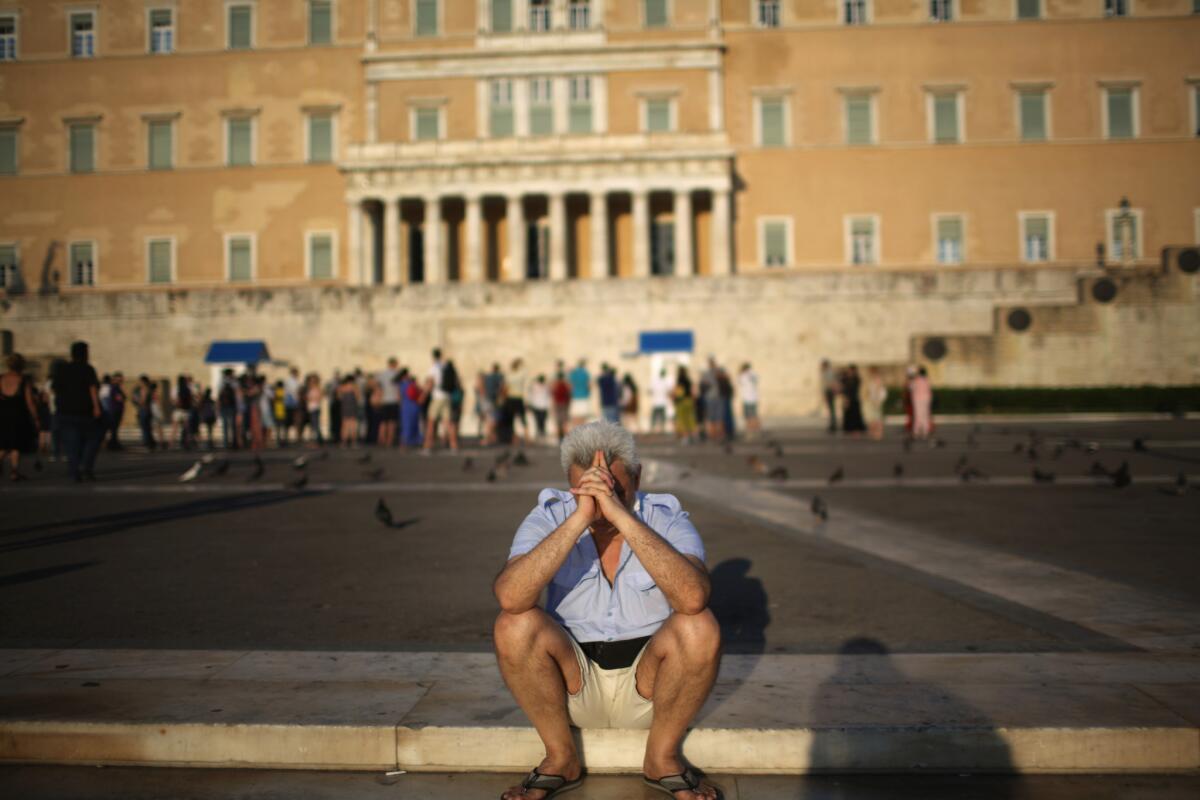Fatigued Greeks are sick of the economic crisis: ‘Just let it be over’

A man sits alone as protesters gather outside the Greek Parliament building in Athens on July 13 to demonstrate against austerity after an agreement for a third bailout with Eurozone leaders.
reporting from ATHENS — As dusk settled on St. Thomas Square on Monday and children rode bicycles among the crisis-weary Greek locals decompressing over coffee frappes and souvlakia, the mood was one of resignation, even relief, that the latest threat of losing their euro currency had been at least temporarily averted.
Neither triumph nor defeat reigned over the two-block gathering place in the heart of the capital’s Goudi neighborhood. Old and young alike seemed inclined to see their government’s about-face on more painful austerity as the best that could be expected from Eurozone creditors bent on humiliating Greece as much as getting paid back for the $270 billion the country already owes them.
“I’m not at all optimistic about how things are going to turn out,” said Theodoris Panayiotopoulos, a 45-year-old unemployed chemist sipping coffee and smoking with his friend, Ilias Georgiou.
A tense weekend of negotiations ended early Monday with a promised third bailout, heavily contingent on fractious Greek lawmakers enacting sweeping reforms in mere days. But the contentious talks exposed rifts within the European Union over how much the member states are willing to do to keep Greece in the 19-nation currency union.
Although French and Italian leaders prevailed in getting Greece one more chance to overcome its legacy of corruption and overspending, a broad span of northern Eurozone states made it clear they were fed up with pouring money into the financial morass that is Athens. And Germany, whose World War II invasion set Greece on a path of occupation and dictatorship that would last decades, has now reclaimed its role as the most resented of Greece’s European neighbors.
“It’s clear to me that the Germans want to create a strong European Union that is a center for them to rule and whoever does not want to play by their rules they want to ostracize,” Georgiou said.
Georgiou and Panayiotopoulos voted “no” in the July 5 referendum on whether to support the creditors’ terms for another bailout.
Constantina Tsivara, 88, sat on a bench in Zografou, a neighborhood not far from Goudi, with her walker standing by.
“I am sick of the whole lot of them,” grumbled the pensioner who supports two unemployed grandsons as well as herself on her $517-a-month income. “I don’t trust any politicians. They are all in it for their own interests and that’s it.”
She reserved most of her anger, though, for the Germans, who made it clear during the weekend negotiations that they were prepared to see Greece leave the currency union.
“I was a child when the tanks came in,” she said. “They took everything. This I can almost say is worse. When you can’t afford to buy a small sardine to eat, the cheapest fish around, it tells you that everything is very, very difficult. I’m sick of all of it.”
Others seemed unexpectedly forgiving of Prime Minister Alexis Tsipras, the 40-year-old leftist who outraged Greece’s creditors by walking out of bailout talks at the end of June. His move to let voters decide whether to accept the lenders’ terms for more loans created an impression among many Greeks of having a say in whether to stay in the Eurozone or revert to their old national currency, the drachma.
More than 61% of voters heeded Tsipras’s advice to reject the final offer for a third bailout in five years, but even more budget-cutting and tax-raising are contained in the package of reforms accepted by the prime minister over the weekend.
“I thought when Tsipras was elected in January that things would change. I believed him,” said Katerina Tama, 40, chatting on a park bench with a friend. “It’s not entirely his fault that things did not change. He didn’t have much of a choice. But I do think things are going to go from bad to worse. We can’t kid ourselves.”
“He’s a good boy. I like him,” Vasilis Batis, 86, said of the brash and youthful Tsipras, as he leaned on a cane and conversed with two other pensioners.
“There is some hope that we are on the path to a solution. What will happen, of course, no one knows,” said Kostas Vartzis, 74, nodding in agreement. Of Tsipras, he said: “I think he’s competent and I’d say he’s proved that he’s got more experience for his years than some other politicians much older than him. He fought hard for us. I have no complaints.”
Katerina Zymnis-Georgalos, an Argentina-born Greek psychologist, has been researching the effect of the prolonged economic crisis on the population.
“People are tired, and when people get tired they just want it to end, badly or well, they don’t care,” she said of the public mood on Monday. “They are saying, ‘Just let it be over.’”
Special correspondent Tsiantar reported from Athens and Times staff writer Williams from Los Angeles.
More to Read
Sign up for Essential California
The most important California stories and recommendations in your inbox every morning.
You may occasionally receive promotional content from the Los Angeles Times.











